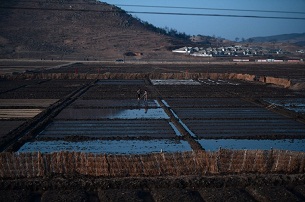North Korea: Citizens asked for 'patriotic rice'
| Publisher | Radio Free Asia |
| Publication Date | 4 December 2012 |
| Cite as | Radio Free Asia, North Korea: Citizens asked for 'patriotic rice', 4 December 2012, available at: https://www.refworld.org/docid/50cb225723.html [accessed 2 June 2023] |
| Disclaimer | This is not a UNHCR publication. UNHCR is not responsible for, nor does it necessarily endorse, its content. Any views expressed are solely those of the author or publisher and do not necessarily reflect those of UNHCR, the United Nations or its Member States. |
2012-12-04
North Korea turns to food donations to feed soldiers and workers.
 Women work on a rice paddy alongside the railway line from Pyongyang to North Pyongan province, April 8, 2012. AFP
Women work on a rice paddy alongside the railway line from Pyongyang to North Pyongan province, April 8, 2012. AFP
Impoverished North Korea has launched a "patriotic rice" campaign to feed soldiers and construction workers, asking farmers and would-be members of the ruling Workers' Party to donate rice to the state even though many suffer from hunger, according to local sources.
The donations are not compulsory, but some citizens feel pressured to give rice out of fear of the powerful regime in the country, which faces chronic food shortages, sources in North Hamgyong province said.
"There is a campaign to have farmers and incoming members of the party donate patriotic rice. Maybe other people could also be asked to do so soon," one source in North Hamgyong told RFA's Korean Service, speaking on condition of anonymity.
Factories are asking the incoming party members to donate the rice, telling workers that if they want to join the party, they should show they are willing to offer something to the country.
Those who want to join the party have no choice but to donate their rice, other sources said, but added that they had not heard of farmers volunteering rice to the campaign on their own.
The cost of rice, a staple of the North Korean diet, makes up a significant portion of the average worker's wages, which for a government worker are officially about 2,000 to 6,000 won (U.S. $0.70 to $2 based on market rates) per month.
In recent weeks, the price of rice had risen to about 6,000 won per kilogram without dropping as it usually does at the end of the harvest season, according to sources in the country.
Relying on donations
North Korea, which relies on food aid from foreign countries, is having its lowest staple food deficit in many years thanks to an increase in food production, according to a report earlier this month by the U.N.'s Food and Agriculture Organization, but still faces widespread malnutrition, the agency said.
Despite the easing of food shortages, the government is still struggling to feed soldiers and workers that it mobilized for construction projects, and is turning to the "patriotic rice" donations to provide their rations, sources said.
A separate source in North Hamgyong province said the "patriotic rice" drive was needed to supplement the soldiers' and construction workers' scant rations.
"It is not about offering rice to the nation but to nearby army camps and construction sites," the source said, speaking on condition of anonymity.
The soldiers' and construction workers' rations had been delayed this year because, although the country's rice harvest has ended, threshing has not been completed due to electricity shortages, the source said.
The insufficient rations were making it hard for them to work while they suffer from hunger, the source said.
The campaign follows an effort launched in February 2011 to combat malnutrition among the country's soldiers by encouraging them to raise their own livestock and grow enough food to feed themselves.
The movement called for soldiers in the 1.2 million-strong army to wipe out malnutrition by breeding their own goats and rabbits, but according to sources in the country the effort has met with little success.
Earlier this year, summer flooding that destroyed large swathes of farmland prompted fears of severe food shortages.
Despite the flooding, North Korea is forecast to have a 10 percent increase from a year before in its 2012 main harvest and 2013 early season crops, according to the Food and Agriculture Organization, but 2.8 million North Koreans remain vulnerable to malnutrition, the agency warned.
Reported by Sung Hui Moon for RFA's Korean Service. Translated by Ju Hyeon Park. Written in English by Rachel Vandenbrink.
Link to original story on RFA website
